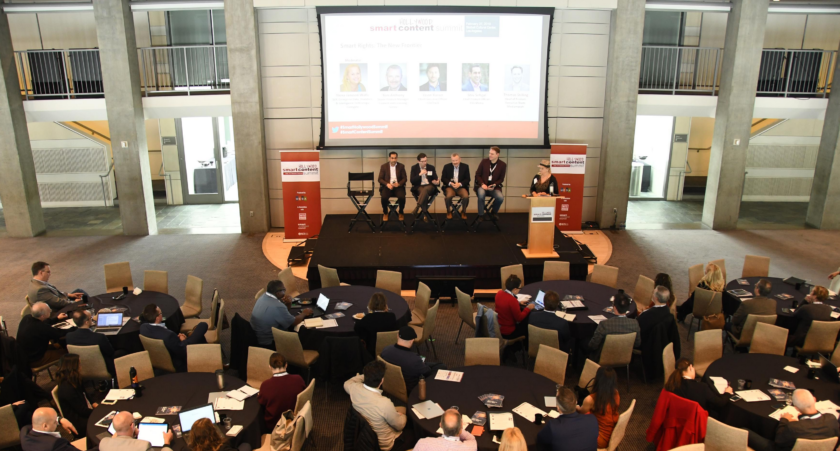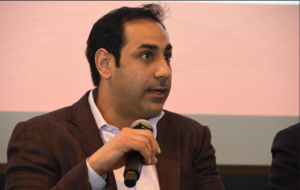M+E Connections

Smart Hollywood Summit: Navigating the New Frontier of Smart Rights
Story Highlights
As the plethora of rights management and sales solutions proliferate through the media and entertainment sector, content creators must balance their need to analyze and control their intellectual property with an increased need to make content easily purchased and delivered to their third-party distributors, according to industry executives from FilmTrack, Mediamorph, RSG Media and Vistex.
Artificial intelligence (AI), blockchain, machine learning (ML), predictive analytics and robot process automation are just some of the technologies that companies are hoping will help them find the holy grail for rights management, they pointed out Feb. 27 during the panel session “Smart Rights: The New Frontier” at the standing-room-only Smart Hollywood Summit.
Panelists discussed their monumental achievements and also some of their collective challenges in building a seamless marketplace for global content distribution.
“I really believe we’re in a revenue stream revolution where there’s all these ways to monetize content now and, from a rights perspective, that’s the really exciting aspect of things,” Shiv Sehgal, RSG Media chief product officer, said, explaining: “We can really look at things from a financial portfolio type of viewpoint and see … all the different ways we can monetize that asset and what makes the [most] sense. And I’m one of the believers that content is king, and the future of television is more television.”
One major challenge that M&E companies face is getting the data they need, organizing that data and then finding it when they need it, according to the panelists, who also included Tom Anthony, senior product manager for content and licensing at Vistex; FilmTrack CEO Jason Kassin; and Thomas Stilling, head of product at Mediamorph.
“It’s kind of mind-boggling [that] just to get clean, robust data is so difficult in our industry,” according to Sehgal, who pointed to the fact that many companies invest in additional metadata providers just to get an extra character of data for their content. The problem is that “it’s really difficult for us as an industry to move forward when we’re kind of bogged down by just step one” of the process, he said, adding that from the perspective of RSG, “we don’t want to be pushing the AI and machine learning stuff if we can’t get to step one.”
 The moderator pointed out that we’re all starting to integrate AI and other new technologies into our daily lives through Amazon, Google and other devices in our homes that can tell us that because we have a certain hat, we need to buy a certain pair of shoes. But she said that type of technology has not really taken hold when it comes to most of our B2B transactions, and she asked the panelists why we can’t say to an Amazon smart device: “Alexa, what can I license in Germany?’”
The moderator pointed out that we’re all starting to integrate AI and other new technologies into our daily lives through Amazon, Google and other devices in our homes that can tell us that because we have a certain hat, we need to buy a certain pair of shoes. But she said that type of technology has not really taken hold when it comes to most of our B2B transactions, and she asked the panelists why we can’t say to an Amazon smart device: “Alexa, what can I license in Germany?’”
Panelists responded that it would be great if we could do that — although it would mean Alexa had broken through all our protection, secure hard drives and cloud services — but the industry still hasn’t really evolved from the days of paper contracts and faces a “cultural challenge,” as so many of the industry’s challenges are. However, panelists pointed out that we are seeing significant improvements, such as the ability to input data into an organization’s system through robotic entries.
One panelist noted that: “Before you can run on AI and machine learning you really have to have a data foundation and you have to work to align and normalize the data that you do have or else all the analytics and everything else just won’t be able to grab the hooks it needs in order to extract that data that you’re looking for.”
Attendees were also warned to be aware of “data orphans”: those pockets and siloes within an organization that can “bring tears to your eye [and] never see the light of day.”
Although blockchain may be a useful technology, panelists expressed concern about its lack of scalability at this time.
Panelists also agreed that, although new technologies are important, it’s probably wise for M&E companies to be, first and foremost, investing in “creative intelligence,” which is “us.”
This year’s Smart Hollywood Summit was produced by MESA’s Smart Content Council with sponsorship by IBM Watson, MarkLogic, EIDR, Hammerspace, human-I-T, Independent Security Evaluators (ISE), KlarisIP, Testronic, FilmTrack, OnPrem, Mediamorph, RSG Media, Vistex, Vubiquity and Bob Gold & Associates.









